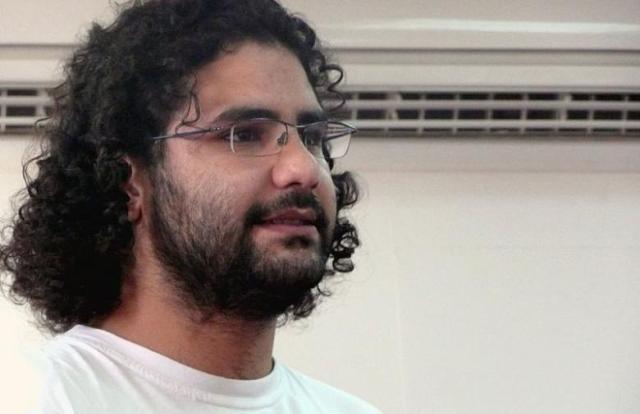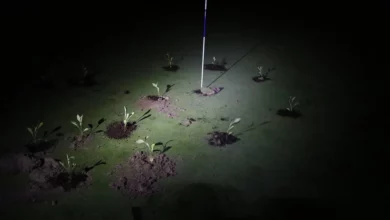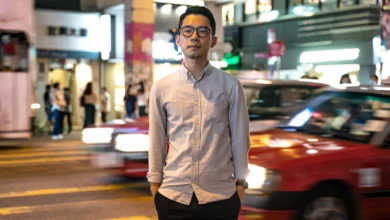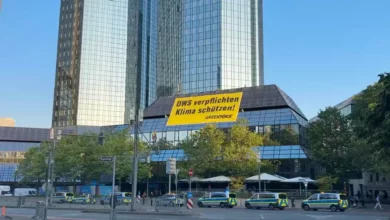
Manal Bahey al-Din, the wife of activist Alaa Abdel Fattah and herself an activist and programmer, published a new blog that Abdel Fattah, who is imprisoned by a decision from a military court, wrote from his prison cell in Tora Prison.
The tone of Alaa, who rejects bringing civilians to military trials, was angry and frustrated. He spent 17 days in the cell for persistently refusing to answer questions put to him by military investigators
In his blog, entitled "Feast, What a return!" Abdel Fattah said he wished to spend the eid holiday with his family for the first time in four years. Abdel Fattah worked for four years as a programmer in South Africa. He could only see his family for a few agitated minutes in prison.
"I was prepared to meet my family this eid, the first eid to spend with family since our return, but the military decided we should not be happy. I spent eid in my cell while my family waited in a long queue that lasted all day. Only a few of them came to visit for few-minutes, while officers – double the number of those visiting me – stood nearby."
He added that he was planning to celebrate his 30th birthday, which is on 28 November, next Friday in Tahrir.
He urged his friends and activists who are opposed to military trials of civilians to celebrate his birthday in Tahrir and call for halting military trials which are “illegal, and violate the constitution and international charters signed by Egypt,” in his words.
He added that he finds solace in the fact that activists have expressed solidarity with his cause, and that several protests have swept Egyptian cities in rejection of military trials of civilians.
Abdel Fattah expressed outrage at not being permitted to attend the birth of his first son, whom he decided to name "Khaled" after Khaled Saeed, the young man who was tortured to death by the police and whose death helped inspire the Egyptian revolution.
"Eid has passed and so will my birthday, but I'm used to spending them away from my family,” he said. “But how could I miss the birth of Khaled , my first child? How will I tolerate being away from Manal at that moment? How will I be able to wait to hear news that they're doing well? How can I tolerate not seeing the face of my son and the face of his mother when she looks at him for the first time?"
"How will I be able to look him in the eye when I had promised him he would be born free? We have decided to name him Khaled to repay Khaled Saeed, to whom we are deeply indebted. But instead of putting those who killed Khaled Saeed in prison, it is we who are in prison!"
Meanwhile, several activists and political powers criticized the military prosecution’s decision on Sunday to extend Abdel Fattah's imprisonment for another 15 days.
Mohamed Samir, coordinator for the Popular Campaign for the Support of ElBaradei, said the military judiciary is seeking to make Abdel Fattah appear like he deserves punishment.
The charges brought against Abdel Fattah are varied but groundless, he added, saying there are other dimensions to the case of which the SCAF is aware. "We won’t allow ourselves to be muzzled again," he said.
Mostafa al-Attar, a member of the media office for the April 6 Youth Movement, described the decision as unfair and warned that freedom-restricting policies will be met with an unprecedented wave of protests.
He called on the SCAF to release Abdel Fattah and all civilians who are being questioned by the military prosecution.
Islam al-Hadary, a political activist and coordinator of a campaign named Take Care, said the imprisonment of Abdel Fattah gives fresh momentum to calls for a million-man protest on 18 November.
He added that the military’s suppression of protesters provides proof of unacceptable practices against revolutionaries, which goes against the revolution’s goals.
Mohamed Saeed, the head of Horeyya Center for Human Rights and Development Studies, criticized practices against activists in general and Abdel Fattah in particular, saying they will drag the country backwards.
"These practices are part of the policies of the former regime and expose the contradictory policies adopted by the SCAF," he said.
"How can the SCAF be a party to the conflict and the arbiter of it? How can the whole world be awaiting the release of Abdel Fattah only for us to learn he’ll remain behind bars?"
Translated from the Arabic Edition




